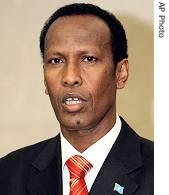2006年VOA标准英语-Somali Leader Wants UN to Lift Arms Embargo(在线收听)
By Alisha Ryu
Nairobi
25 September 2006
 Ali Mohamed Gedi |
||
----
Somali Prime Minister Ali Mohamed Gedi was in the Kenyan capital of Nairobi Monday, telling officials and reporters here that his country is in the grip of a radical Islamic movement, led by terrorists with links to al-Qaida.
"It is an expansion of fundamentalists, terrorists. It is affecting not only Somalia, but the whole region, the whole continent and the world as well," said Mr. Gedi. "Unless collective efforts are brought together by the international community, this new phenomenon cannot be stopped. It is very serious. It is death and life."
Accusing Islamic extremists in Mogadishu of inviting foreign fighters to carry out the country's first-ever suicide attack in Baidoa last Monday, Mr. Gedi says the United Nations Security Council must act now and counter the Islamists' threat by paving the way for the deployment of a nearly 8,000-strong regional east African peacekeeping force. He also says the United Nations should end its arms embargo so government forces can meet the Islamic threat.
"They all must be unanimous to lift the arms embargo on Somalia in order to prepare and re-establish our national security forces, train them and equip them in order for them to protect Somali soil, the government and the people of Somalia," added Mr. Gedi.
In Mogadishu, officials with the Supreme Islamic Council of Somalia, who deny having terrorist ties, reiterated their opposition to the peacekeeping proposal. Late Sunday, the Islamic militia took over the strategic southern port of Kismayo, in part to prevent the port from being used as a landing base for peacekeepers.
Kismayo, located about 500 kilometers south of the Somali capital, was taken peacefully from a factional leader, who fled as the Islamists advanced into the town. But on Monday, violence broke out after Islamist fighters burned the Somali flag and replaced it with the flag of Islam.
Several thousand angry locals poured out into the streets and rioted for several hours, throwing stones, burning tires, and shouting, "We do not want the Islamic courts." A 13 year-old boy was reportedly killed and several others wounded when Islamic militiamen opened fire on a crowd.
Meanwhile, Prime Minister Gedi would not comment on reports from the provincial town of Baidoa, where the interim government is based, of several hundred more Ethiopian troops being sent there to help protect the fragile government from an Islamist attack.
Reports of Ethiopian troops in Somalia have circulated since June, when Islamists seized the capital from factional leaders and began extending their power rapidly throughout the country. Ethiopia, which strongly backs Somalia's secular government, has repeatedly denied its troops are in Somalia and accuses rival Eritrea of providing arms to Islamists.
The tense standoff between the Islamists and the transitional government has fueled fears that the conflict could turn into a wider regional war.